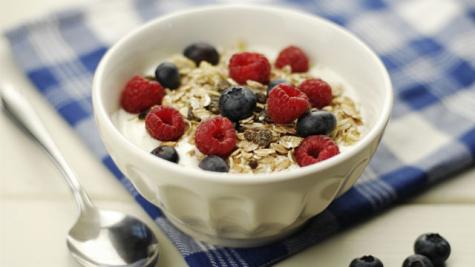Even when mothers get off to a good start with breastfeeding, very often there is a reduction in breastfeeding rates within weeks or months after delivery.
Experts say this is when mums need help – if not from a professional, than from partners, other mums who have ‘been there and done that’ or who are also breastfeeding.
There are many reasons why a woman might need support – just one of them is finding the time and convenience to eat properly.
Being a new mum, it isn't always easy to find time! So here are ten powerhouse foods that are quick and convenient, and will help ensure you get the nutrition you need for you and your baby.
1. Oats
Oats are a completely natural whole grain, high-fibre food. A bowl of muesli made from natural oats, or porridge, will keep you full for a long time after breakfast and may help increase your milk supply. Plus, oats are high in iron. The good news is that ‘quick oats’ – the kind that cook in the microwave in a minute – are just as healthy as the ‘traditional’ style oats. But avoid pre-packaged instant products, which usually contain extra salt and sugar.
2. Almonds
Almond aren’t just packed with protein; they’re a good non-dairy source of calcium. And the every little bit helps. Breastfeeding mums should take in 1000 mg of calcium per day. That’s because the milk you make is high in calcium, and if you don’t get enough in your diet, your bones and teeth could be robbed of calcium they need.
But there are exceptions. If you’re allergic to almonds, they’re obviously a no-no. And if your family history includes a history of nut allergies, you might want to hold off on them until your baby is at least three months old, since food proteins more easily pass from a mum to her baby’s bloodstream in the first three months of baby’s life.
3. Apricots
Apricots contain dietary fibre, vitamin A, vitamin C and potassium, all essential nutrients. Eating apricots can also increase prolactin which is the hormone that tells your body to produce milk. Fresh, whole apricots are a better source of fibre than canned apricots; if you go canned, look for ones packed in water or natural juices, instead of sugary syrup. Dried apricots are also good for a snack.
4. Salmon
This could be the perfect meat for breastfeeding mums. It’s high in protein, and also contains large amounts of DHA, a type of fat that’s important to the development of baby’s nervous system. Wild-caught or farm-raised salmon are both good for you. If you don’t eat dairy, you can eat canned salmon, which contains tiny salmon bones, to get some extra calcium.
5. Yogurt
Stocking your fridge with yogurt is smart because it’s got both protein and calcium (and with all those flavours available, you’re bound to find a few you love). Just beware that some breastfeeding mums are told to give up dairy if baby is diagnosed with milk protein intolerance. Signs your baby could be one of them include frequent spitting up, diarrhoea, bloody stools, rashes, coughing and wheezing.
6. Beans
Fibre-rich kidney, black, pinto and other beans can be good for your digestive system, and they’re fantastic sources of iron and protein.
7. Spinach
Actually, pretty much any dark green, leafy veggie is a breastfeeding super food. That includes broccoli too. They’re all-around nutrient-dense and even high in calcium, so you can get a veggie serving and a calcium-rich serving in one, delicious, leafy food.
8. Dates
Dates are another calcium-rich food - and they’re thought to help increase milk supply, since they increase prolactin like apricots do. They’re also a high-fibre, naturally sweet treat. Chop some and add them to your morning muesli or porridge.
9. Sesame seeds
Sesame seeds are packed with calcium, and are a good source of fibre, iron, magnesium, phosphorus, copper and manganese. Toast them and sprinkle them over a salad of dark leafy greens. Or add some to your veggies; green beans and sesame seeds are a tasty combo.
10. Brown rice
Skip the white stuff. Brown rice is better for you because it’s got more fibre and other nutrients. Complex carbs like brown rice (and oats) help keep you full and keep your blood sugar at consistent levels.








 Agree (0)
Agree (0) Disagree (
Disagree (











__small.png)










